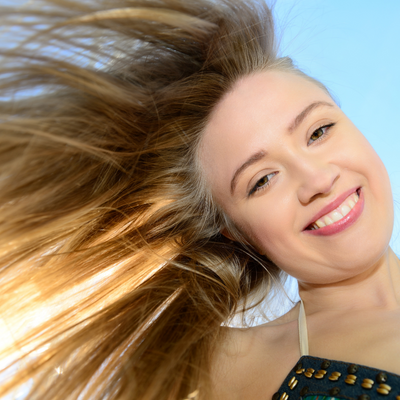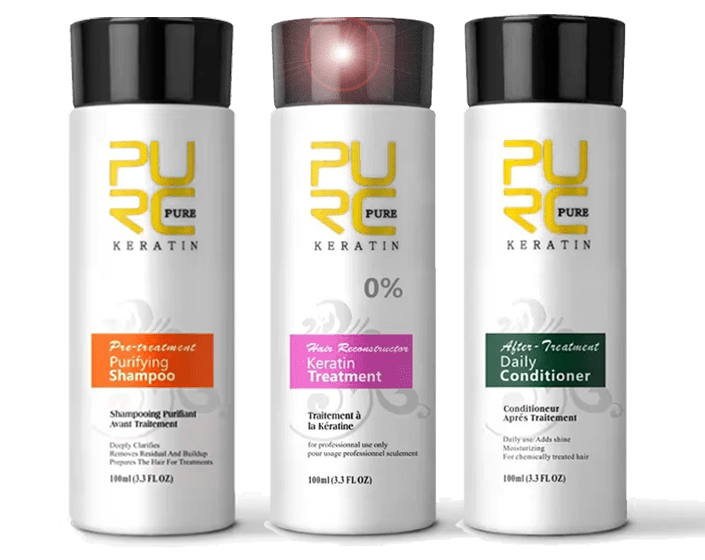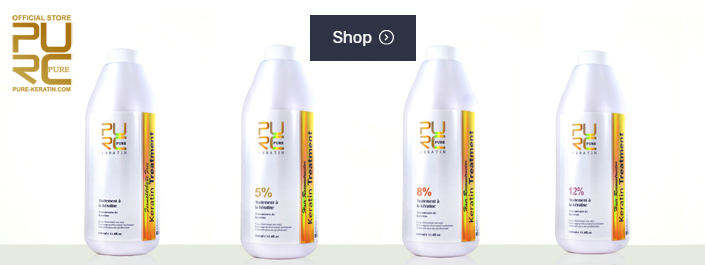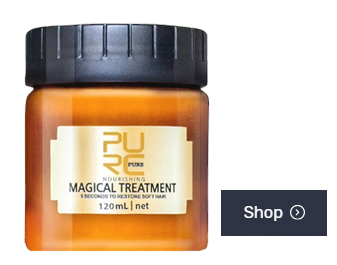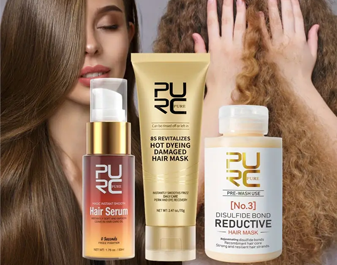Best keratin treatment for natural hair
PURE KERATIN on 9th Jul 2024
Best Keratin Treatment for Natural Hair
Introduction
What is Keratin?
Keratin is a protein that naturally occurs in the hair, skin, and nails. It is responsible for the strength, structure, and resilience of these tissues. In the context of hair, keratin helps maintain its integrity, keeping it smooth and shiny. However, various factors such as environmental stressors, chemical treatments, and heat styling can deplete keratin, leading to frizzy, damaged, and unmanageable hair.
Keratin Treatments: An Overview
Keratin treatments are designed to replenish this essential protein in the hair, providing a protective layer that smooths and strengthens the hair shaft. These treatments can significantly reduce frizz, enhance shine, and make hair more manageable. They are particularly popular among individuals with natural hair, who often face challenges related to dryness, tangles, and shrinkage.
Why Keratin Treatments Are Popular
The popularity of keratin treatments has surged in recent years, especially among those with natural hair. This rise can be attributed to the numerous benefits these treatments offer. From drastically reducing styling time to improving overall hair health, keratin treatments cater to the needs of many seeking smoother, more manageable hair.
Benefits of Keratin for Natural Hair
For natural hair, which tends to be more prone to dryness and breakage, keratin treatments can be transformative. They help seal the hair cuticle, locking in moisture and reducing porosity. This results in hair that is not only smoother and shinier but also less prone to damage and breakage. Moreover, keratin treatments can help elongate natural curls, making them easier to manage and style.
Types and Categories
Traditional Keratin Treatments
Traditional keratin treatments often contain formaldehyde or formaldehyde-releasing agents. These treatments work by breaking down the hair’s natural structure and then sealing the keratin back into the hair with heat. This process leaves the hair smooth, shiny, and frizz-free for several months. However, due to health concerns associated with formaldehyde, many are seeking alternatives.
How Traditional Treatments Work
The process typically involves washing the hair with a clarifying shampoo to remove any buildup, applying the keratin treatment, and then sealing it in with a flat iron. The heat from the iron helps bond the keratin to the hair, creating a smooth, protective layer.
Typical Ingredients
Common ingredients in traditional keratin treatments include keratin, hydrolyzed proteins, and formaldehyde or its derivatives. These components work together to strengthen the hair and reduce frizz.
Formaldehyde-Free Keratin Treatments
In response to health concerns, many brands have developed formaldehyde-free keratin treatments. These alternatives use safer ingredients to achieve similar results without the associated risks.
Benefits of Formaldehyde-Free Options
Formaldehyde-free keratin treatments offer the benefits of smoother, more manageable hair without the potential health risks of formaldehyde exposure. They are a safer option for both clients and stylists, making them increasingly popular.
Popular Brands and Products
Some well-known brands offering formaldehyde-free keratin treatments include Keratin Complex, Cezanne, and KeraGreen. These products are designed to deliver smooth, shiny hair without compromising safety.
Brazilian Blowout
A Brazilian blowout is a specific type of keratin treatment known for its ability to smooth hair while maintaining volume and movement. It differs from traditional keratin treatments in its application process and results.
What is a Brazilian Blowout?
A Brazilian blowout involves applying a liquid keratin formula to the hair, which is then blow-dried and flat-ironed to seal in the treatment. The process creates a protective protein layer around the hair shaft, eliminating frizz and promoting a sleek appearance.
Differences from Other Keratin Treatments
Unlike some traditional keratin treatments, Brazilian blowouts allow for more customization. They can be tailored to achieve varying levels of smoothness and frizz control, making them suitable for a wider range of hair types and textures.
Soft Keratin Treatments
Soft keratin treatments are a gentler option designed for individuals with sensitive or damaged hair. These treatments use milder formulations to provide the benefits of keratin without the potential for harsh side effects.
Gentle Options for Sensitive Hair
Soft keratin treatments are ideal for those with fine, fragile, or previously damaged hair. They offer a more subtle smoothing effect, reducing frizz and enhancing shine without altering the hair’s natural texture too drastically.
Advantages and Disadvantages
While soft keratin treatments are less intensive and safer for sensitive hair, they may not provide as long-lasting or dramatic results as traditional or Brazilian keratin treatments. However, they offer a valuable alternative for those seeking a gentler approach.
Symptoms and Signs
Benefits and Results of Keratin Treatment
Keratin treatments are celebrated for their transformative effects on hair. The most notable benefits include:
- Smoother Hair: Keratin treatments can significantly reduce frizz, resulting in smoother, more polished hair.
- Enhanced Shine: The protein infusion adds a natural sheen to the hair, making it look healthier and more vibrant.
- Improved Manageability: Post-treatment, hair is easier to comb, style, and maintain, cutting down on daily styling time.
- Reduced Breakage: By strengthening the hair shaft, keratin treatments help reduce breakage and split ends.
Possible Side Effects
Despite their benefits, keratin treatments can have potential side effects. These may include:
- Allergic Reactions: Some individuals may experience allergic reactions to the ingredients used in keratin treatments.
- Hair Breakage: If not properly maintained, hair can become brittle and prone to breakage after a keratin treatment.
- Scalp Irritation: The chemicals used in some treatments can cause scalp irritation or discomfort.
- Fading Color: Keratin treatments can sometimes alter the color of dyed hair, leading to fading or changes in hue.
Causes and Risk Factors
Causes of Hair Damage
Understanding the causes of hair damage is crucial in determining the need for keratin treatments. Common causes include:
- Environmental Factors: Sun exposure, pollution, and harsh weather conditions can weaken hair over time.
- Chemical Treatments: Frequent coloring, perming, and relaxing can strip hair of its natural proteins and oils.
- Heat Styling: Excessive use of blow dryers, flat irons, and curling irons can lead to dryness and breakage.
- Mechanical Damage: Rough handling, such as aggressive brushing and tight hairstyles, can cause physical damage to the hair shaft.
Risk Factors Affecting Keratin Treatment Effectiveness
Several factors can influence the success and longevity of keratin treatments:
- Hair Type and Condition: The natural texture and health of the hair can affect how well it responds to treatment. Healthier hair may see more dramatic results.
- Previous Chemical Treatments: Hair that has been previously treated with chemicals may react differently to keratin treatments, sometimes requiring extra care or adjustments.
- Maintenance Routine: Proper aftercare is essential to maintain the benefits of keratin treatments. Using sulfate-free shampoos and conditioners can help prolong the effects.
Diagnosis and Tests
Hair Analysis Before Treatment
Before undergoing a keratin treatment, it's important to assess the health and condition of the hair. This can be done through a professional hair analysis.
Importance of Assessing Hair Health
Assessing hair health helps determine the appropriate type of keratin treatment and ensures the best possible results. It involves evaluating the hair's porosity, elasticity, and overall condition.
Methods of Hair Analysis
Hair analysis can be conducted by a professional stylist using visual inspection, tactile assessment, and specialized tools to measure porosity and elasticity.
Patch Test for Allergies
To prevent allergic reactions, a patch test should be conducted before applying the full treatment.
How to Conduct a Patch Test
A small amount of the keratin product is applied to a discreet area of the skin, usually behind the ear or on the inner arm. The area is monitored for 24-48 hours for any signs of irritation or allergic reaction.
Importance of Allergy Testing
Allergy testing is crucial to avoid adverse reactions that can cause discomfort or more serious health issues during the treatment process.
Treatment Options
Professional Keratin Treatments
Professional keratin treatments are performed in salons by experienced stylists. They offer the most reliable and long-lasting results.
What to Expect During a Salon Visit
A typical salon visit for a keratin treatment involves several steps:
- Consultation: The stylist assesses the hair and discusses the client's goals.
- Preparation: The hair is washed with a clarifying shampoo to remove any buildup.
- Application: The keratin product is applied to the hair and left to process for a specified time.
- Heat Sealing: The hair is blow-dried and flat-ironed to seal in the treatment.
- Aftercare Advice: The stylist provides recommendations for maintaining the treatment at home.
Costs and Duration
The cost of professional keratin treatments can vary widely based on location, salon, and hair length. On average, treatments range from $150 to $400 and can take 2-4 hours to complete.
At-Home Keratin Treatments
For those who prefer a more convenient and cost-effective option, at-home keratin treatments are available. These kits allow individuals to perform the treatment themselves.
Popular At-Home Kits
Some popular at-home keratin treatment kits include:
- Keratin Research Original Formula
- L'ANZA Keratin Healing Oil Treatment
- OGX Ever Straight Brazilian Keratin Therapy
Steps for Applying at Home
- Preparation: Wash hair with a clarifying shampoo and towel-dry.
- Application: Apply the keratin product evenly, ensuring all strands are covered.
- Processing: Allow the product to sit for the recommended time.
- Heat Sealing: Blow-dry and flat iron the hair to seal in the treatment.
- Aftercare: Follow specific aftercare instructions to maintain results.
Maintenance Tips Post-Treatment
Maintaining the results of a keratin treatment requires proper aftercare:
- Use Sulfate-Free Products: Sulfate-free shampoos and conditioners help preserve the treatment.
- Avoid Excessive Washing: Washing hair too frequently can strip away the keratin.
- Protect Hair from Heat: Minimize the use of heat styling tools and always use a heat protectant.
- Stay Away from Chlorine: Chlorine in swimming pools can diminish the effects of the treatment.
Preventive Measures
Protecting Hair from Damage
Preventing hair damage is key to maintaining healthy, beautiful hair. Here are some tips:
- Limit Heat Styling: Reduce the frequency of using hot tools and always apply a heat protectant.
- Choose Gentle Hairstyles: Avoid tight ponytails or braids that can cause breakage.
- Stay Hydrated: Drink plenty of water and use moisturizing hair products to keep hair hydrated.
- Get Regular Trims: Regular trims help remove split ends and prevent further damage.
Healthy Hair Habits
Adopting healthy hair habits can significantly improve the condition of your hair:
- Use a Silk Pillowcase: Silk pillowcases cause less friction, reducing breakage and frizz.
- Deep Condition Weekly: Regular deep conditioning treatments help restore moisture and strengthen hair.
- Avoid Over-Washing: Washing hair too often can strip it of natural oils, leading to dryness and damage.
- Protect Hair in the Sun: Wear a hat or use hair products with UV protection when spending time outdoors.
Personal Stories or Case Studies
Testimonials from Keratin Treatment Users
Many individuals have experienced positive results from keratin treatments. Here are some testimonials:
"I've struggled with frizzy hair my whole life. After getting a keratin treatment, my hair is smooth, shiny, and much easier to manage. I can't believe the difference!" - Jane D.
"As someone with natural hair, I was skeptical about keratin treatments. But it has made my hair so much more manageable and reduced my styling time significantly." - Rachel S.
Before and After Experiences
Seeing is believing! Here are some before and after stories from those who have undergone keratin treatments:
"Before my keratin treatment, my hair was dry and difficult to style. After the treatment, it's smooth, soft, and looks much healthier. I love it!" - Emily R.
"My curls were always frizzy and unmanageable. The keratin treatment helped elongate my curls and reduced frizz. I'm so happy with the results!" - Samantha K.
Expert Insights
Quotes from Hair Stylists
Hair stylists and professionals share their insights on keratin treatments:
"Keratin treatments can be a game-changer for those with natural hair. They not only smooth and strengthen the hair but also make it much easier to manage daily." - John A., Professional Stylist
"It's important to choose the right type of keratin treatment for your hair type and follow proper aftercare to maintain the results. Consultation with a stylist can help determine the best option for you." - Linda B., Hair Care Expert
Dermatologist Advice
Dermatologists emphasize the importance of safety and proper application of keratin treatments:
"While keratin treatments can offer great benefits, it's crucial to ensure that the products used are safe and free from harmful chemicals like formaldehyde. Always conduct a patch test and follow the recommended guidelines." - Dr. Sarah M., Dermatologist
Conclusion
Summary of Key Points
Keratin treatments offer numerous benefits for those with natural hair, including reduced frizz, enhanced shine, and improved manageability. Various types of keratin treatments are available, from traditional to formaldehyde-free options, catering to different needs and preferences. Understanding the potential side effects, proper aftercare, and preventive measures can help maximize the benefits of these treatments.
Call to Action
If you're considering a keratin treatment, consult with a professional stylist to determine the best option for your hair type. Remember to follow proper aftercare to maintain your results and protect your hair. For more information and tips, visit our blog and stay updated on the latest hair care trends and treatments.














